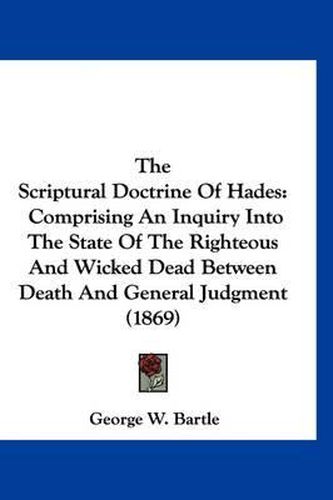Readings Newsletter
Become a Readings Member to make your shopping experience even easier.
Sign in or sign up for free!
You’re not far away from qualifying for FREE standard shipping within Australia
You’ve qualified for FREE standard shipping within Australia
The cart is loading…






Purchase of this book includes free trial access to www.million-books.com where you can read more than a million books for free. This is an OCR edition with typos. Excerpt from book: CHAPTER III. The text supposed by some to teach that death is the extinction of man ?A bad explanation worse than no explanation?The diligent inquirer after truth often disappointed when consulting the Scriptural expositors?Bishop Patrick’s Commentary on Psalm vi. 5?Further consideration of the first opinion concerning death?Mind and matter essentially contrary to each other?Motion the result of thought ?Matter passive?Mind active?Matter obeys?Mind commands? Instrumentality the only connection between mind and matter?Matter destructible?Mind indestructible?Difference in the creation of vegetables, animals, and man?The common view as to the derivation of the word Adam erroneous. In the previous chapter I mentioned a few texts which have been thought sufficient by some people to authorize the conclusion that the Bible regards death as the extinction of a man’s body and soul. Having carefully investigated those passages of Scripture to which allusion has been made, I pointed out how very common is the usage with the inspired writers to employ the word soul, not only for the immortal part of man, but for the man himself; and examples were adduced to corroborate what I asserted. There still remains, however, one most important text which seems, at first sight, very strong and decisive in favor of the view by which death is considered the end of man. This text is written in the fifth verse of the sixth Psalm, where we thus read:
For in death there is no remembrance, of thee; in the grave who shall give thee thanks ? ThAopding quotation fi tbe writings rf- 4be?, P, solmist cannot fail to produce an impression of the first magnitude on the minds of all that may be inclined to question the fact of man’s continuous existence after he has passed the Jordan of death. The words…
$9.00 standard shipping within Australia
FREE standard shipping within Australia for orders over $100.00
Express & International shipping calculated at checkout
Purchase of this book includes free trial access to www.million-books.com where you can read more than a million books for free. This is an OCR edition with typos. Excerpt from book: CHAPTER III. The text supposed by some to teach that death is the extinction of man ?A bad explanation worse than no explanation?The diligent inquirer after truth often disappointed when consulting the Scriptural expositors?Bishop Patrick’s Commentary on Psalm vi. 5?Further consideration of the first opinion concerning death?Mind and matter essentially contrary to each other?Motion the result of thought ?Matter passive?Mind active?Matter obeys?Mind commands? Instrumentality the only connection between mind and matter?Matter destructible?Mind indestructible?Difference in the creation of vegetables, animals, and man?The common view as to the derivation of the word Adam erroneous. In the previous chapter I mentioned a few texts which have been thought sufficient by some people to authorize the conclusion that the Bible regards death as the extinction of a man’s body and soul. Having carefully investigated those passages of Scripture to which allusion has been made, I pointed out how very common is the usage with the inspired writers to employ the word soul, not only for the immortal part of man, but for the man himself; and examples were adduced to corroborate what I asserted. There still remains, however, one most important text which seems, at first sight, very strong and decisive in favor of the view by which death is considered the end of man. This text is written in the fifth verse of the sixth Psalm, where we thus read:
For in death there is no remembrance, of thee; in the grave who shall give thee thanks ? ThAopding quotation fi tbe writings rf- 4be?, P, solmist cannot fail to produce an impression of the first magnitude on the minds of all that may be inclined to question the fact of man’s continuous existence after he has passed the Jordan of death. The words…